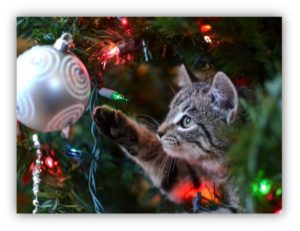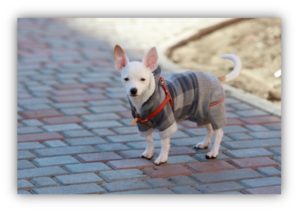The holidays are here, so I would like to take a few moments to remind pet owners in the College Station and Bryan area to stay alert for seasonal hazards related to our pets. There’s nothing worse than a pet accident when we’re all trying to have a nice holiday celebration with the family (pets included).
Here is my list of hazards and recommendations to keep everyone safe.
1. Keep Your Pets Away from People Food
Some foods we eat can cause mild to severe stomach upset, while others can be highly toxic and cause death in a pet. Here are some of the most dangerous holiday foods that are toxic to animals:
- Chocolate, Coffee, and Caffeine
- Poultry bones
- Nuts
- Alcohol
- Raisins and grapes
- Xylitol-the sweetener found in sugar-free gum
- Yeast dough
- Onions, Garlic, Chives
- Avocado
A SAFE RULE OF THUMB: To avoid an emergency over the holidays, play it safe. Keep all people’s food away from your pets. Also, if you have guests, remind them not to feed your dogs or cats any of their food nor leave any dropped food on the floor or ground for your pets to snatch up!
2. Protect Your Pets from Holiday Decorations
At first glance, holiday decorations may seem harmless. But realize, these are new items in your home, and most pets will be curious.
ORNAMENTS: These shiny objects attract pets who may want to play with them, chew on them, or eat them. My recommendation – and I know this isn’t always possible – is to have non-breakable ornaments.
TINSEL: Tinsel can result in severe damage to your pet’s intestines if ingested, so keep this one out of your house if possible.
ELECTRICAL CORDS: Maybe your pet does not usually chew on electrical cords. But when you put up your Christmas tree, this is something new to them. They may get attracted to Christmas light cords. Electrical shock may occur when a pet bites down on an electrical cord. Injuries can range from burns in and around the mouth to electrocution and possible death. Check your holiday lights for signs of fraying or bite marks on the cord and use a grounded three-prong extension cord as a safety precaution.
If you notice any inclination to chew on cords, then my recommendation is to keep Christmas lights unplugged when you are not around to supervise. You can also purchase cord protectors such as the PetCords Dog and Cat Cord Protector.
HELPLINE: Call us or the Pet Poison Helpline for treatment advice if you suspect your dog or cat has been electrocuted or eaten something they shouldn’t have.
3. Decorative Flowers and Plants
Poinsettias, Lilies, Amaryllis, and Holly are popular Christmas decorations. Unfortunately, they are toxic to pets. But here are some nice alternatives:
- Red roses instead of Poinsettias
- White Orchids instead of Lilies
- Achira instead of Amaryllis
- Autumn Olive instead of Holly
4. Protect Your Pets from Cold Weather During the Holidays
Just like people, pets’ cold tolerance can vary from pet to pet based on their coat, body fat stores, activity level, and health.
Long-haired or thick-coated dogs tend to be more cold-tolerant but are still at risk in cold weather. Short-haired pets feel the cold faster because they have less protection.
Pets with diabetes, heart disease, kidney disease, or hormonal imbalances (such as Cushing’s disease) may have difficulty regulating their body temperature. They may be more susceptible to problems from temperature extremes. The same goes for very young and senior pets. If you need help determining your pet’s temperature limits, give us a call.
I recommend keeping cats inside during cold weather seasons. If your pet lives outside make sure fresh water is ALWAYS available, dehydration occurs in cold weather just as it does in hot weather. Remember if temperatures fall below freezing so will your pet’s water source.
Accompany your dog outdoors when they need to relieve themselves or get some exercise. Keep in mind that if you get cold and want to go back inside, chances are, your dog is getting too cold as well.
Our Best Wishes to You This Holiday Season
The whole team here at College Hills Veterinary Hospital wishes you happy holidays. Please follow the above holiday tips to keep your pets safe for the holiday season and prevent unfortunate emergencies.
We are here for you if you have any questions about pet safety or anything else regarding your pet’s health. We believe that communication is the foundation of a solid doctor-patient-client relationship.
Dr. Kim Stewart
College Hills Veterinary Hospital
College Station, Texas
